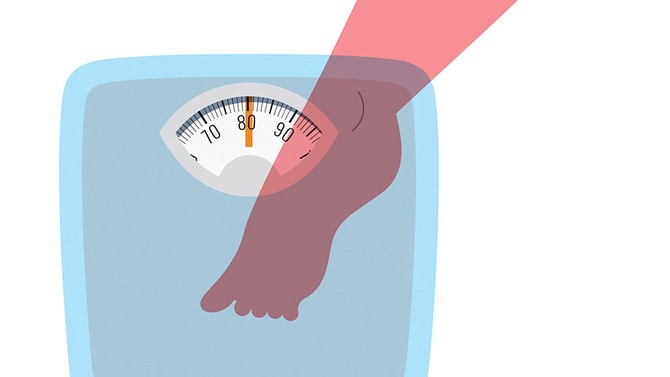9 New Rules for Making Habits That Stick
Do you start each new year with lofty ambitions—only to end up
in a rut six months later? It might be time to rethink your approach
to resolutions.
Rule 3: It's Not Your Butt—It's Your Brain
To develop a successful get-fit plan, you must override your
brain's impulses.
Think about how you've set weight loss goals in the past. Did you vow to hit the gym more, run a marathon, or start a weekly walking group with your friends, only to flake on your plans after a few weeks? "Many fitness and weight loss resolutions are intentions like balloons released into the air—they fade out of sight very quickly," says Walter Mischel, PhD, a professor of psychology at Columbia University and author of The Marshmallow Test: Mastering Self-Control. To see your way to success, Mischel says you first have to understand how the brain works.
The brain's "hot" part is the limbic system, which is reflexive, primitive, and immediate (useful in caveman days or to dodge a bullet), but it's also the "Gimme! Gimme!" part—the one that has you hitting the snooze button when you're supposed to get ready for the gym or agreeing to happy hour when you're scheduled for Zumba. To keep us from acting on all our desires, the brain is balanced with a rational and reflective "cool" system, located primarily in the prefrontal cortex, which developed later in the evolutionary process. When temptation strikes, the hot system activates and can lead to poor impulse control, says Mischel. But you can tap into your cool side to outsmart your knee-jerk response by coming up with if-then scenarios.
If you've heard and tried this approach before with little success, it's probably because your statements weren't specific enough. If you regularly skip the gym, tell yourself, "If I get off work at 6 p.m., I will put on my workout clothes and run one mile." Or, "If I'm going up only four flights, I'll take the stairs." Unlike a vague plan, which can easily be overruled by your hot system, a specific strategy can quickly bring your cool rational system into play—making you more likely to do the right thing. Several studies have shown that among groups with the same goals, participants who form if-then plans end up being more successful.
— Sarah Z. Wexler
We pulled stats from a sample of the 75 million users of MyFitnessPal, one of the most popular weight-loss tools worldwide, to find out which strategies are most successful.
30+ People who have lost 30-plus pounds are twice as likely to plan their meals and snacks ahead of time than those who have lost 5 pounds or less.
3x That's how much more weight people lose when they share their food diary with friends (compared with those who keep their eating habits private).
6+ 33 percent of people who have lost more than 40 pounds exercise at least six times per week.
Think about how you've set weight loss goals in the past. Did you vow to hit the gym more, run a marathon, or start a weekly walking group with your friends, only to flake on your plans after a few weeks? "Many fitness and weight loss resolutions are intentions like balloons released into the air—they fade out of sight very quickly," says Walter Mischel, PhD, a professor of psychology at Columbia University and author of The Marshmallow Test: Mastering Self-Control. To see your way to success, Mischel says you first have to understand how the brain works.
The brain's "hot" part is the limbic system, which is reflexive, primitive, and immediate (useful in caveman days or to dodge a bullet), but it's also the "Gimme! Gimme!" part—the one that has you hitting the snooze button when you're supposed to get ready for the gym or agreeing to happy hour when you're scheduled for Zumba. To keep us from acting on all our desires, the brain is balanced with a rational and reflective "cool" system, located primarily in the prefrontal cortex, which developed later in the evolutionary process. When temptation strikes, the hot system activates and can lead to poor impulse control, says Mischel. But you can tap into your cool side to outsmart your knee-jerk response by coming up with if-then scenarios.
If you've heard and tried this approach before with little success, it's probably because your statements weren't specific enough. If you regularly skip the gym, tell yourself, "If I get off work at 6 p.m., I will put on my workout clothes and run one mile." Or, "If I'm going up only four flights, I'll take the stairs." Unlike a vague plan, which can easily be overruled by your hot system, a specific strategy can quickly bring your cool rational system into play—making you more likely to do the right thing. Several studies have shown that among groups with the same goals, participants who form if-then plans end up being more successful.
— Sarah Z. Wexler
In Data We Trust
We pulled stats from a sample of the 75 million users of MyFitnessPal, one of the most popular weight-loss tools worldwide, to find out which strategies are most successful.
30+ People who have lost 30-plus pounds are twice as likely to plan their meals and snacks ahead of time than those who have lost 5 pounds or less.
3x That's how much more weight people lose when they share their food diary with friends (compared with those who keep their eating habits private).
6+ 33 percent of people who have lost more than 40 pounds exercise at least six times per week.
From the January 2015 issue of O, The Oprah Magazine


